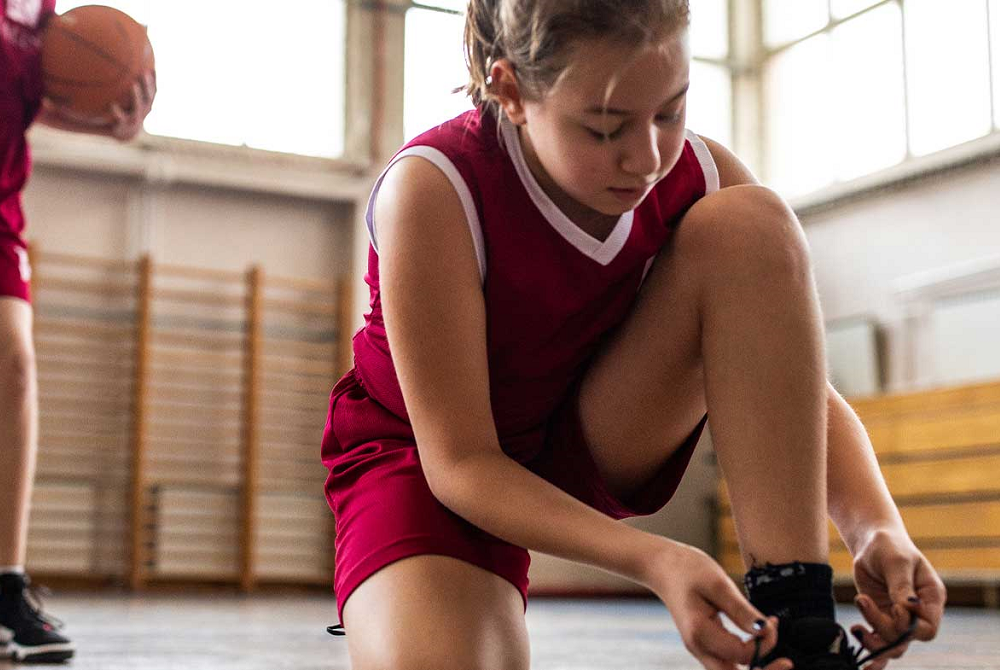
Sports Injuries & Student Athletes: A Parent’s Guide
February 6, 2024
Playing sports is a great way for children of all ages to maintain a healthy lifestyle. It also builds confidence and teaches them valuable life lessons, like working as a team and the value of hard work. While it may be every sports fanatic’s dream to have their kid make it big time in the arena or on the diamond, sometimes pushing young athletes to be the best at a young age can lead to serious injuries that will take them out of the game altogether.
 "Sports help with physical and psychological well-being," says Matthew Santa Barbara, M.D., a sports medicine physician at Henry Ford Health. "However, year-round participation in a single sport at a young age can lead to overuse injuries and mental burnout."
"Sports help with physical and psychological well-being," says Matthew Santa Barbara, M.D., a sports medicine physician at Henry Ford Health. "However, year-round participation in a single sport at a young age can lead to overuse injuries and mental burnout."
Nowadays, many kids will start playing one sport at a young age and continue to play that same sport year-round for years. This can be harmful to your child because his or her soft tissue and bone structures aren't fully developed. Furthermore, the pressures of year-round participation and focus on excelling, rather than enjoyment, can negatively affect a young athlete's mental health.
Basketball causes the most injuries among high schoolers, causing many visits to the emergency room each year for stressed and torn ankle ligaments. In baseball, the Tommy John surgery, a procedure to reconstruct torn ligaments in the elbow after overuse, has also been increasingly used to treat young athletes still in high school.
How To Prevent Sports Injuries
Preparing your children appropriately before a sports season begins and supporting them during the season is important. Dr. Santa Barbara offers four key pieces of advice to help your youth athletes avoid injury.
1. Don’t limit your child to one sport. Playing a variety of sports in different seasons is a great way to work different parts of the body. When your child gets older, they can make the transition to playing a single sport they are good at and enjoy.
2. Warm up. Make sure your child is properly warming up before they play any sport. Dynamic warmups--incorporating exercises that involve moving the body such as lunges, high knees and arm circles – are preferable to stretching alone.
3. Strengthen core muscles. Building up core strength takes pressure off joints in the arms and legs. It gives young athletes more momentum and can help improve their performance.
4. Abide by rest rules. Many schools and sports leagues have rules in place to limit how many teams kids are on or how often they play. Follow these to ensure your child is allowing time for their joints and muscles to recover from physical activity.
Children participating in a sport should never push through pain, and injuries should be promptly evaluated by a sports medicine physician. Physical injuries are often more obvious, while mental health issues due to sports participation can be more subtle. Symptoms such as fatigue and declining performance can be signs of burnout. In these situations, rest is also important.
"Sports should be fun for kids," says Dr. Santa Barbara. "Avoiding single-sports specialization at a young age keeps the focus on enjoyment while reducing the physical and psychological risks of year-round participation."
To find a sports medicine provider at Henry Ford Health, visit henryford.com/sportsmedicine or call 313-651-1969.
Matthew Santa Barbara, M.D., is a non-operative sports medicine physician at Henry Ford Health. He sees patients at the Henry Ford Center for Athletic Medicine in Detroit, Henry Ford West Bloomfield Hospital, Henry Ford Medical Center - Columbus, Henry Ford Medical Center - Bloomfield Township and Henry Ford Medical Center - Fairlane.

Why Spring Sports Injuries Are Common & How To Prevent Them
April 11, 2023
When spring is in the air, athletes of all ages head outdoors to play their favorite sports, including softball, baseball, tennis, lacrosse and track & field.
 Unfortunately, the change of season also ushers in injuries, says Joseph Medellin, M.D., a primary care sports medicine doctor at Henry Ford Medical Center-Jackson. A variety of factors can cause spring sports injuries, including:
Unfortunately, the change of season also ushers in injuries, says Joseph Medellin, M.D., a primary care sports medicine doctor at Henry Ford Medical Center-Jackson. A variety of factors can cause spring sports injuries, including:
► Too much or too little winter activity: With shorter days and colder temperatures, some athletes aren’t as active in winter. Even if you are going to the gym regularly, sport-specific muscles – like muscles in the chest and shoulder that help you throw a baseball – may weaken.
At the start of a new sports season, a sudden increase in the demand on these muscles can lead to injury. Taking steps to get ready for spring sports before the season starts can lower this risk. It’s also not uncommon for multi-sport athletes to have games and practices year-round with multiple practices in one day. Not allowing yourself enough downtime can lead to overuse injuries, including strains and sprains.
► Transitioning outdoors: Winter sports often take place on hard surfaces, like wood basketball courts, gyms and treadmills. These surfaces are flat, making it easier to maintain your footing. Spring sports involve soft running surfaces like grass and turf that are uneven. They can also be wet, muddy or icy due to spring weather. All these circumstances increase the risk of injury due to falls.
Cold weather can also be a factor. Early spring temperatures can still be quite cold. It takes longer for muscles to warm up, and they might not work as efficiently. This can be especially troublesome with sports like softball where there are lulls in activity between innings. Playing with cold muscles can increase the risk of sprains and strains.
► Sport-specific movements: Throwing, sprinting and kicking are moves that most people don’t do on a daily basis. They require powerful motions that can stress unconditioned muscles and joints. This is especially true if you haven’t been cross-training to strengthen supporting muscles or haven’t gradually increased your intensity.
A sprinter may experience hip pain from running at full speed around the curve of a track. Rotator cuff injuries can occur in sports that involve throwing, like the javelin, shot put, and baseball and softball. Soccer players can pull their groin from repeatedly taking long kicks.
If You Suspect A Sports Injury, Don’t Put Off Care
A doctor’s office is often the last place eager athletes want to be at the start of the season. But pain should not be a regular part of your training program. If you think you’ve sustained an injury, trying to push through often makes it worse.
Making time to see the doctor can be challenging, especially if you have to miss a practice or game for your appointment. But it’s worth it. “The sooner you get evaluated, the sooner we can get you on the path to recovery,” Dr. Medellin says.
The opposite can be said when treatments are delayed. “The longer you’ve had an injury, the longer it may take to heal,” explains Dr. Medellin. “And first-line treatments aren’t as likely to be successful, which can mean more time away from your sport.”
Sports Injury Treatments That Keep You In The Game
Seeing a doctor doesn’t always mean you’ll have to sit out the season. Treatment may include intermittent rest, as long as you don’t have a severe injury like a stress fracture or tendon tear. “We may recommend a return to sport at a lower intensity or with additional rest days to see if the pain goes away,” says Dr. Medellin.
Patients with minor injuries might also benefit from physical therapy between practices. Physical therapists can correct poor form. They can also help you safely stretch and strengthen injured muscles to promote healing. Conditioning through Henry Ford Health's sports performance program can also speed recovery and prevent injury.
“A sports medicine doctor’s goal is to keep athletes active and involved in the sport they love,” says Dr. Medellin. “That’s what I want for my patients.”
To find a sports medicine provider at Henry Ford Health, visit henryford.com/sportsmedicine or call 313-651-1969.
Joseph Medellin, M.D., is a primary care sports medicine doctor at Henry Ford Medical Center-Jackson.

